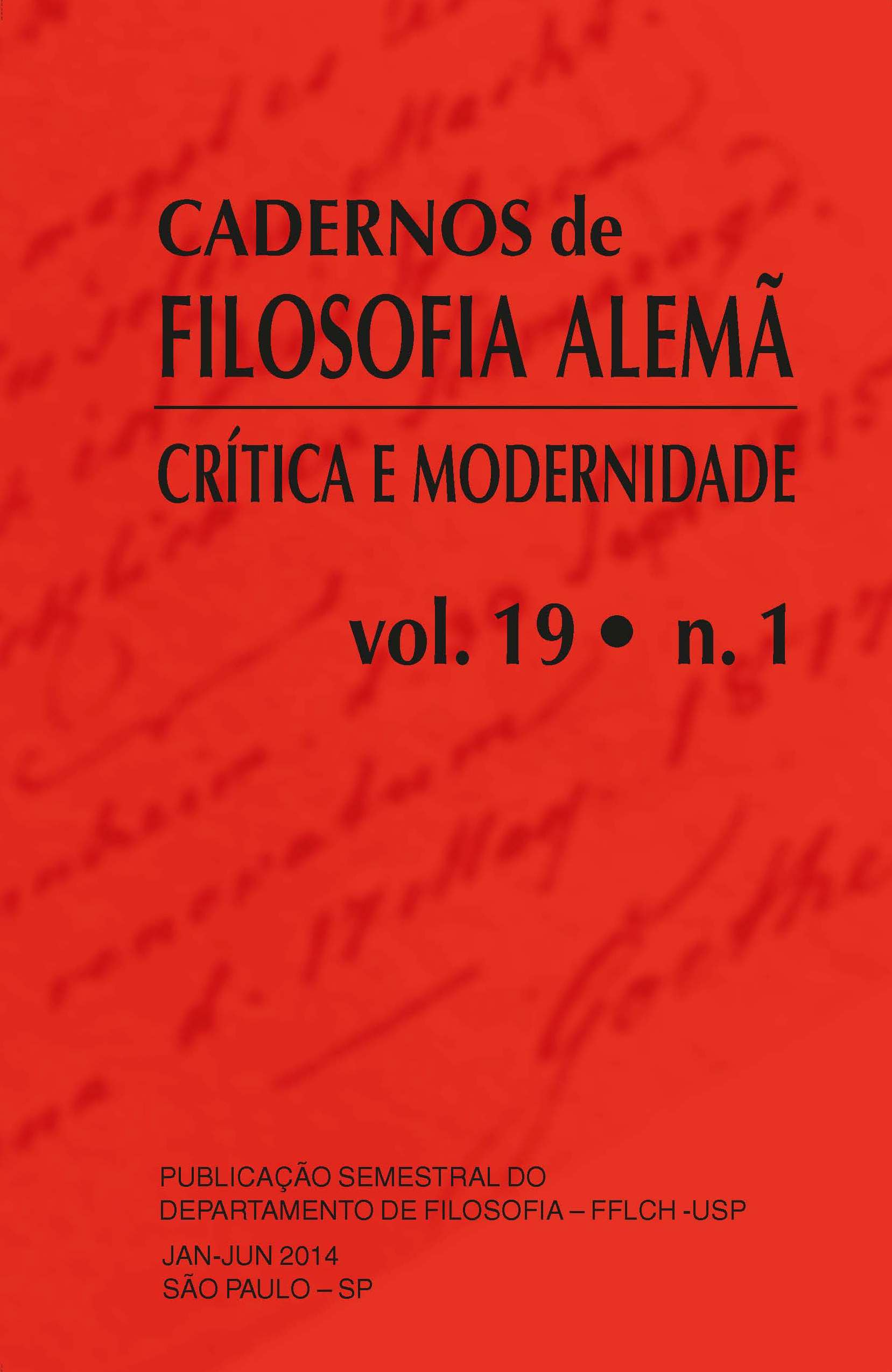The subjective time as a result of the Kantian doctrine of self-affection
DOI:
https://doi.org/10.11606/issn.2318-9800.v19i1p149-168Keywords:
Kant, Self-affection, Subjective time, Schematism, Objective timeAbstract
The aim of this work is to demonstrate that Kant's doctrine of self-affection leads to a consciousness of a purely subjective time. First, we analyze the §§ 8 and 24 of the Critique of Pure Reason in order to understand the distinction between an a priori and an empirical point of view about self-affection. Second, we compare the doctrine of self-affection with the transcendental schematism to underline that the a priori temporality of self-affection is not identified with the objective time of the schematism.
Downloads
References
ALLISON, H. Kant’s Transcendental Idealism: an Interpretation and Defense. New Heaven/London: Yale University Press, 1983.
ARENAS, L. El esquematismo de los conceptos matemáticos: una interpretación. Endoxa, Madrid, n. 8, 1997, pp. 111-136.
BAUM, M. Deduktion und Beweis in Kants Transzendentalphilosophie: Untersuchungen zur Kritik der reinen Vernunft. Königstein: Hain Verlag bei Athenäum, 1986.
BAUM, M. The B-Deduction and the Refutation of Idealism. The Southern Journal of Philosophy, Memphis, v. XXV, Suplement, 1986, pp. 89-107.
BUTTS, R. Kant’s Schemata as Semantical Rules. In: BECK LEWIS, W. Kant Studies Today. Illinois: Open Court, 1969, pp. 290-300.
DIRSCHAUER, S. La théorie kantienne de l’auto-affection. Kant-Studien, Berlin/New York, v. 95, n. 1, 2004, pp. 53-85.
DÜSING, K. Objektive und subjektive Zeit. Untersuchungen zu Kants Zeittheorie und zu ihrer modernen kritischen Rezeption. Kant-Studien, Berlin/New York, v. 71, 1980, pp.1-34.
HEIDEGGER, M. Kant und das Problem der Metaphysik. Frankfurt am Main: Klostermann, 1991.
JÁUREGUI, C. Sentido interno y subjetividad: un análisis del problema del auto-conocimiento en la filosofía trascendental de Kant. Buenos Aires: Prometeo, 2008.
KANT, I. Kants Werke. Akademie Textausgabe. Berlin: Walter de Gruyter, 1968.
KANT, I. Crítica de la razón pura. Traducción de Mario Caimi. Buenos Aires: Colihue, 2007.
KEMP SMITH, N. A Commentary to Kant’s Critique of Pure Reason. Cuarta edición. London: Palgrave MacMillan, 2003.
KLEMME, H. Kants Philosophie des Subjekts: Systematische und entwicklungsgeschichtliche Untersuchungen zum Verhältnis von Selbstbewuβtsein und Selbsterkenntnis. Hamburg: Felix Meiner Verlag, 1996.
LA ROCCA, C. Schematismus und Anwendung. Kant-Studien, Berlin/New York, v. 80, n. 2, 1989, pp. 139-154.
MOHR, G. Das sinnliche Ich: inneren Sinn und Bewuβtsein bei Kant. Würzburg: Königshausen & Neumann, 1991.
Moledo, F. Función sistemática y naturaleza del esquematismo trascendental. Ágora: Papeles de Filosofía, Santiago de Compostela, v. 30, n. 2, 2011, pp. 163-185.
MOREAU, J. Intuition et Appréhension. Kant-Studien, Berlin/New York, v. 71 n. 3, 1980, pp. 282-298.
NAKANO, H. Selbstaffektion in der transzendentalen Deduktion. Kant-Studien, Berlin/New York, v. 102, n. 2, 2011, pp. 213-231.
PHILONENKO, A. Lectura del esquematismo trascendental. Ágora: Papeles de Filosofía, Santiago de Compostela, v. 7, n. 1, 1988, pp. 9-25.
SEEL, G. Die Einleitung in die Analytik der Grundsätze, der Schematismus und die obersten Grundsätze (A 130/B 169 – A 158/B 197). In: MOHR, G. y WILLASCHEK, M (Hrg). Immanuel Kant. Kritik der reinen Vernunft. Berlin: Akademie Verlag, 1998, pp. 217-246.
STRAWSON, P. The Bounds of Sense. London: Metheuen & Co. Ltd., 1966.
ZOELLER, G. Making Sense out of inner Sense: The Kantian Doctrine as Illuminated by the Leningrad Reflexion. International Philosophical Quarterly, New York, v. XXIX, n. 3, 1989, pp. 263-270.
Downloads
Published
Issue
Section
License
Copyright (c) 2014 Matías Orono

This work is licensed under a Creative Commons Attribution-NoDerivatives 4.0 International License.
Information and conceptions on the texts are complete responsibility of the authors.
All the articles submitted before July 5th 2018 and those published after July 2021 are licensed under a CC BY-NC-ND license – except those published between the aforementioned dates, which are under the CC BY-NC-SA license. The permission for the translation of the material published under the license CC BY-NC-ND by third parts can be obtained with the consent of the author.
Open access policies - Diadorim
Rules applied before July 5th 2018:
Presenting a submission to our Editorial Board implies granting priority of publication for “Cadernos de filosofia alemã”, as well as transferring the copyright of texts (once published), which will be reproduced only with the manifest authorization of the editors. Authors keep the right to reuse the texts published in future editions of their work, without paying any fees to "Cadernos”. We will not grant the permission to re-edit or translate the texts for third parts without agreement of the author.


